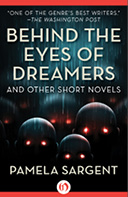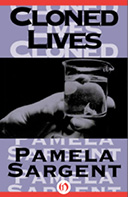The Mountain Cage (51 page)
Authors: Pamela Sargent

For Mamie, recalling too many memories was as confusing for her as not having any at all.
In retrospect, Dorothea’s insight into this dysfunction seems obvious. Mamie—and other “first generation” longlifers—lacked a sense of continuity. They were easily distracted, incapable of extended periods of concentration; people who had experienced life as a series of discrete moments with no unifying framework. The central principle of narrative therapy, according to Dorothea, was that memory and coherent recollection lay in the ability to tell a story, to make an epic of all of one’s memories.
Mamie, as had so many others, had drifted passively from one event to the next, from one distraction to another, and that had severely damaged her ability to tell stories about herself, to weave the fabric of her memories and life into a continuous narrative. Because she couldn’t tell a good story, she couldn’t really remember anything, even when the incidents of her life were easily available for recollection.
Being a memory coach wasn’t enough; we had to become narrative therapists, and the demand for our services could only grow. There were many like Mamie, people who had been unable to resist the distractions of their time, who had become little more than spectators of events and passive participants in simulated experiences. But we had hopes …
Yes, our failures were legion. It’s almost impossible to have a successful outcome unless the client is willing to erase his past memories entirely and start afresh. That’s simply too close to death for most people; however fragmented a self might be, it rarely wants to lose that self. But in the lives of the few who had avoided Mamie’s problem, we saw a remedy—better yet, a way to prevent narrative dysfunction.
These few were the fortunate ones who had exercised their minds, who had read many books in various formats and studied difficult subjects in depth, who had built up the neural connections in their brains that gave them the continuity they needed to tell good stories. Long novels with lots of characters and narrative strands, lengthy historical accounts that enable one to understand one’s historical context—that’s the way to build yourself up. Work out with some Tolstoy and Balzac, maybe some Dickens! Even better, keep a journal, master the art of telling or writing a good story. All that’s necessary, as the old saying goes, is to sit down and open a vein.
Excuse me—I got carried away. Historically, such pursuits were always the province of the few, and now we have even more distractions than people did in the old days. I realize that we narrative therapists are probably fighting a losing battle, but stories must be told! Our health demands this special way of ordering our minds!
Well, I hope you have a good story to tell me. I haven’t heard a good one lately.
Afterword to “Too Many Memories”:
And here these stories end.
All rights reserved, including without limitation the right to reproduce this book or any portion thereof in any form or by any means, whether electronic or mechanical, now known or hereinafter invented, without
the express written permission of the publisher.
These are works of fiction. Names, characters, places, events, and incidents either are the product of the author’s imagination or are used fictitiously. Any resemblance to actual persons, living or dead, businesses, companies, events, or locales is entirely coincidental.
“The Other Perceiver” by Barry N. Malzberg. Copyright © 2002 by Barry N. Malzberg.
“The Sleeping Serpent.” Copyright © 1992 by Pamela Sargent. First appeared in Amazing Stories, January 1992 atfid in What Might Have Been, Volume 4, Alternate Americas, edited by Gregory Benford and Martin H. Greenberg (New York: Bantam, 1992).
“The Mountain Cage.” Copyright © 1983 by Pamela Sargent. First appeared as a chapbook published by Cheap Street, New Castle, Virginia; Jan O’Nale and George O’Nale, publishers.
“Common Mind.” Copyright © 2000 by Wizards of the Coast, Inc. First appeared in Amazing Stories, Issue 600, January 2000.
“All Rights.” Copyright © 1994 by TSR, Inc. First appeared in Amazing Stories, Fall 1994.
“Danny Goes to Mars.” Copyright © 1992 by Pamela Sargent. First appeared in Isaac Asimov’s Science Fiction Magazine, October 1992.
“Hillary Orbits Venus.” Copyright © 1999 by Wizards of the Coast, Inc. First appeared in Amazing Stories, Spring 1999.
“Fears.” Copyright © 1984 by Pamela Sargent. First appeared in Light Years and Dark, edited by Michael Bishop (New York: Berkley Books, 1984).
“The Novella Race “ Copyright © 1978 by Damon Knight. First appeared in Orbit 20 (New York: Harper & Row, 1978). “Collectors.” Copyright © 1996 by Pamela Sargent. First appeared in Castle Fantastic, edited by John DeChancie and Martin H. Greenberg (New York: DAW, 1996).
“Isles.” Copyright © 1996 by Pamela Sargent. First appeared in Phantoms of the Night, edited by Richard Gilliam and Martin H. Greenberg (New York: DAW, 1996).
“The Summer’s Dust.” Copyright © 1981 by Mercury Press, Inc. First appeared in The Magazine of Fantasy & Science Fiction, July 1981.
“Dream of Venus.” Copyright © 2000 by Pamela Sargent. First appeared in Star Colonies, edited by Martin H. Greenberg and John Helfers (New York: DAW, 2000).
“Too Many Memories.” Copyright © 2000 Nature Publishing Group. First appeared in Nature, November 30, 2000.
Copyright © 2004 by Pamela Sargent
Cover design by Andy Ross
978-1-5040-1042-9
This edition published in 2015 by Open Road Integrated Media, Inc.
345 Hudson Street
New York, NY 10014


FRESH EBOOK DEALS, DELIVERED DAILY
BE THE FIRST TO KNOW ABOUT
FREE AND DISCOUNTED EBOOKS
NEW DEALS HATCH EVERY DAY
FROM OPEN ROAD MEDIA







